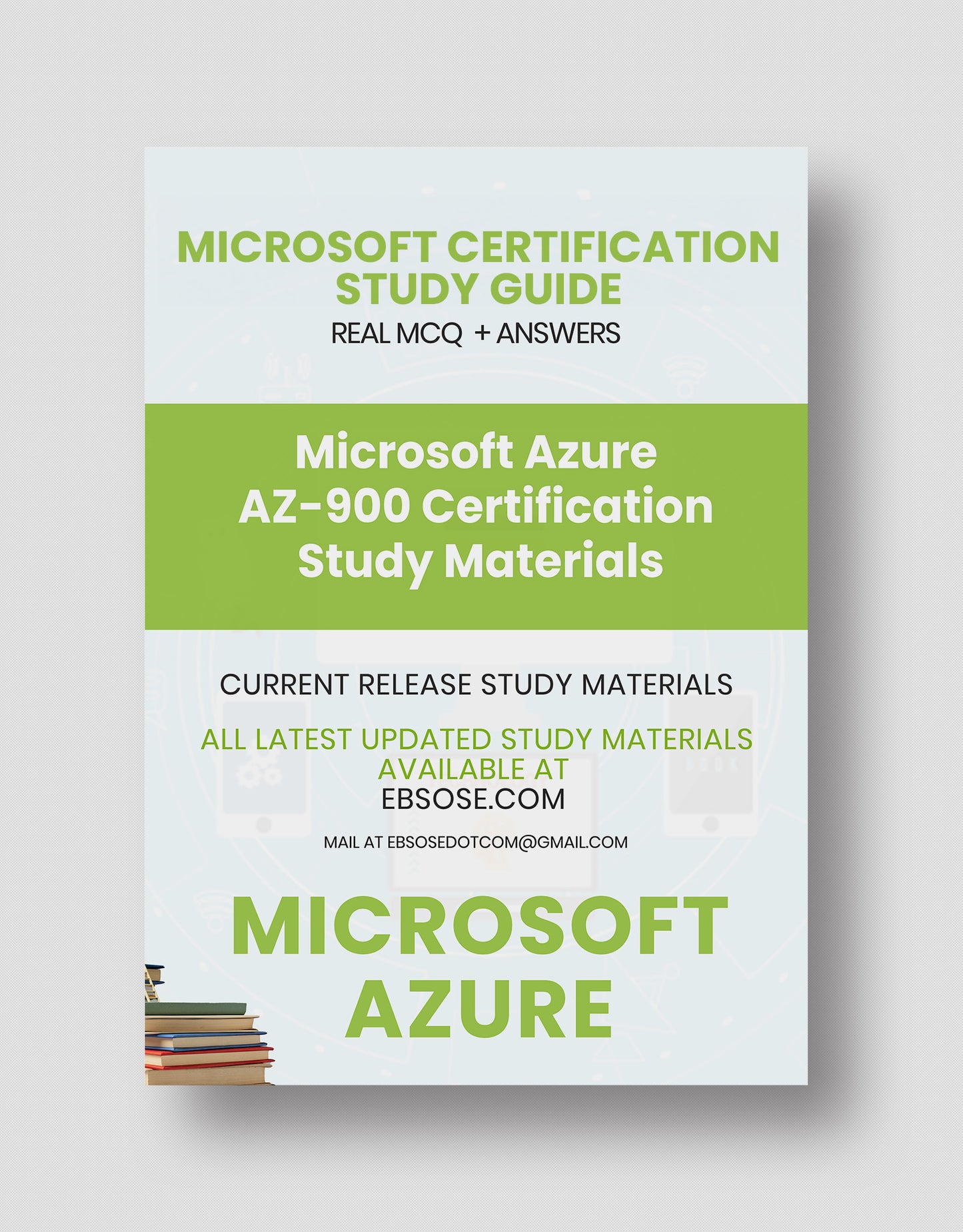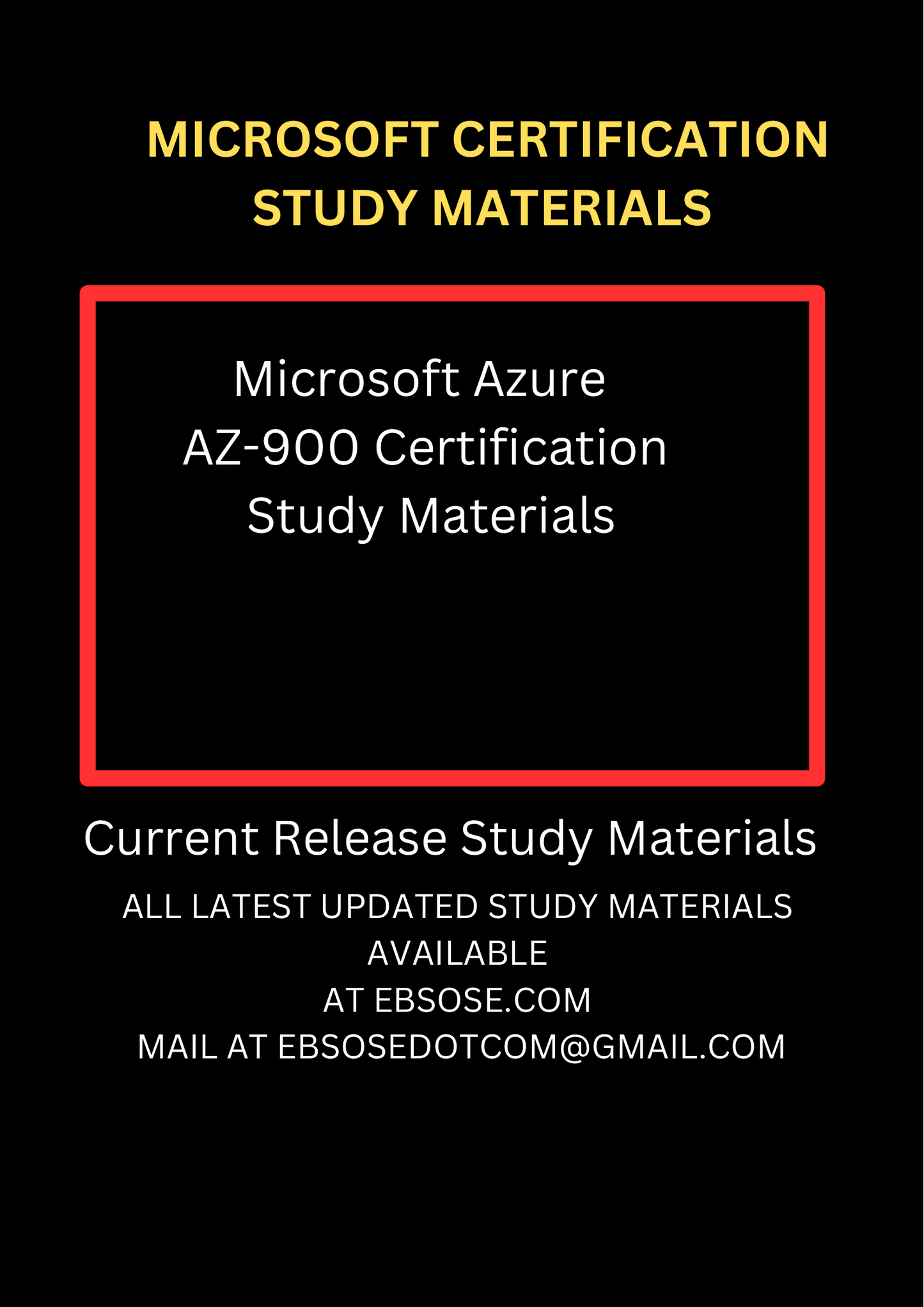Microsoft Certifications
Microsoft Azure AZ-900 Certification Study Materials
Microsoft Azure AZ-900 Certification Study Materials
Couldn't load pickup availability
Azure is Microsoft’s fastest-growing large cloud platform. This exam is about basic concepts of Azure cloud and hence a good start for those who are new in the Azure world.
What is Az-900 Exam?
Azure is Microsoft’s fastest-growing large cloud platform. This exam is about basic concepts of Azure cloud and hence a good start for those who are new in the Azure world. AZ-900 is not an easy exam to pass even though it is a fundamental exam. This exam tests your foundational level information on cloud concepts and Azure administrations. People from technical and non-technical can prepare for this exam and can validate their Azure Cloud services skills and making them competent enough for the next Azure role-based certifications.
The Azure Fundamentals exam is one of the biggest opportunities to prove knowledge yourself about the cloud concepts, There are some cloud concepts such as Azure services, Azure workloads, security and privacy in Azure, as well as Azure pricing and support to have a better understanding of the cloud functioning. The candidates who are going to appear for the exam should be familiar with the core technology artifacts, which include the concepts of storage, networking, cloud computing, seamless application support, and complete application development.
Azure Fundamentals are the desired skill that can be used to prepare for other Azure-based or other certain similar certifications, but keep in mind that it is not a prerequisite for any of them or is not dependent on any other exams.
For those who already have experience in Azure services, this is a great opportunity to prove your knowledge about core concepts of Azure including various services, pricing, security, administration, and support. Azure services have capabilities like computing, Storage, Networking, App services, Artificial Intelligence (AI), Internet of Things (IoT), Integration, and Security.
Az-900: Syllabus and Format
The syllabus for the AZ-900 exam mainly focuses on foundational concepts of cloud-based services with respect to Azure. It includes core azure services like compute, storage, and networking. This also covers security and privacy services, the azure support model, and pricing.
There are generally 40-60 questions and many of them are in multiple-choice answer format. The duration to attain this exam is 1 hour.
The passing score for this exam is 70% and the percentage-wise break up of skills measured by the module is as below:
Describe cloud concepts (15-20%)
- Understanding differences between Public, private, and hybrid cloud models. A hybrid cloud may be a sort of cloud computing that combines on-premises infrastructure or a private cloud with a public cloud and permit data and apps to move between the two.
- Cloud provides services in different categories – Infrastructure-as-a-Service (IaaS), Platform-as-a-Service (PaaS), and Software-as-a-Service (SaaS), and Serverless and not just the Virtual machines.
- Understanding the benefits of using Azure and terms around agility, availability, scalability, fault tolerance, disaster recovery, and Capital Expenditure (CapEx) vs Operational expenditure (OpEx)
Describe core Azure services (30-35%)
- In this section, you need to prepare basic building blocks of Azure core architectural concepts like regions, resource groups, availability zones, etc. Azure services are offered in regions throughout the world. The azure region is consisting of one or more data centers, also referred to as availability zones. Azure is available in 60+ regions globally. New regions and data centers get added every year. Each Azure region is consisting of one or more data centers, also referred to as availability zones.
- Azure has computed services like App services, Virtual machines, containers, Kubernetes, etc.
- Azure Storage services have a blob, queue, and table storage, Disk storage, file storage, and Database (SQL/NoSQL) storage like Azure SQL server, MySQL database, Cosmos DB, PostgreSQL, and Azure DB migration services.
- Virtual networks, application gateway, and load balancer, firewalls are part of Azure networking services. Some of the questions will be included in the exam around the on-premises network to Azure virtual network integration, Virtual networks, Subnets, Traffic filtering, etc.
- Azure service like function app, logic apps, and event grid fall into Serverless computing and also supports other solutions such as the internet of things (IoT), Artificial intelligence, Dev test labs, Big data, analytics, etc.
- Azure provides various resource management tools like PowerShell, cloud shell, Azure CLI, and azure advisor.
Describe security, privacy, compliance, and trust (25-30%)
- Network security groups (NSG), firewalls, key vaults, and Azure security centers are considered security building blocks in Azure and help to arrange network traffic to and from Azure resources.
- Access management for all Azure resources can be managed by using Role-based access control (RBAC), Azure active directory, and multi-factor authentication (MFA).
- Azure monitor and service health makes a difference when it comes to execution and accessibility of your applications and proactively distinguishing issues in seconds.
- You need to understand the services like Trust center, compliance manager, and terms like ISO, GDPR, Identity Protection policies, Azure data security, etc. to achieve the compliance goal of your organization.
- Azure has a service known as Azure Government which is a physically separated instance of Azure to meet the compliance and security standards for US government workloads. Similarly, Azure launched ‘Azure Germany’ in 2018 to meet German data privacy regulations and rules.
Describe Azure pricing Service Level Agreements, and Lifecycles (20-25%)
- In this section, most of the questions will be asked about Azure cost management, zone-wise billing concept, and Azure cost management.
- Azure Provides a Pay as you go as well as reserved instances pricing model with different pricing units for each service.
- You also need to read about services available in the free Azure account, various offerings to purchase azure products and services, and service level agreements (SLA).
- You need to understand the Lifecycle of features, preview features, monitor features are also important sections to focus on.
- Azure has a wider range of support plans like Basic, Developer, Standard, and Professional Direct. You can choose any plan supports plans as per your need. You may get more information about it by visiting
https://azure.microsoft.com/en-gb/support/plans/
How to prepare for this exam?
You can prepare for this exam from learning resources like Microsoft learn, Azure Documentation, Instructor-led Training, Forum, etc.
Prerequisites
As already mentioned in the beginning this exam is great to start for beginners in cloud solutions, there are no prerequisites for this exam and no prior technical experience is required.
Learning Path
To study for this exam, you can follow the below simple path:
- Understand the basics of cloud computing.
- Take an overview of core azure services compute, storage, and networking.
- The practice below 3 hands-on labs:
- Create virtual machines, virtual private networks, and their peering, try to integrate load balancers and application gateways.
- Create app services, and check available app service plans and their pricing.
- Play around with storage options available blobs, queues, cosmos DB, etc.
- Take an overview of security and pricing model concepts.
- For remaining topics, you can refer to short courses or glance at Microsoft docs just before the exam.
Tips and tricks
- You can implement a few POCs for basic features of Azure services and practical knowledge of those Azure services will help you to understand questions faster.
- Take look at all answer choices available before making a final choice.
AZ 900 Exam Pricing and scheduling Information
The exam charge is subject to change with the country from where you're taking this exam. Let’s say in case you're living within the India then the exam fee is ~3700 INR.
Share




